The Bio Based Battery Market is estimated to be valued at USD 120.0 million in 2025 and is projected to reach USD 223.2 million by 2035, registering a compound annual growth rate (CAGR) of 6.4% over the forecast period. Analysis of CAGR across the timeline highlights a steady, compounding growth pattern driven by rising demand for sustainable energy storage alternatives and growing regulatory pressure to reduce reliance on conventional lithium-ion systems.
Between 2025 and 2030, the market progresses from USD 120.0 million to USD 163.7 million, adding USD 43.7 million, supported by the early commercialization of bio-based electrodes and electrolytes targeting small-scale electronics and niche renewable energy applications. In the later phase, from 2030 to 2035, growth accelerates slightly, contributing USD 59.5 million as large-scale adoption gains traction in grid storage, electric mobility, and consumer electronics, aided by advancements in energy density and life cycle performance of bio-based chemistries. CAGR consistency reflects the market’s gradual transition from R&D-driven pilots to industrial-scale manufacturing, with Asia-Pacific emerging as the key growth hub due to active government support and raw material availability. Manufacturers focusing on scalable production, competitive cost structures, and integration of bio-polymers for higher efficiency will capture significant opportunities as sustainability-centric energy storage continues to expand globally.
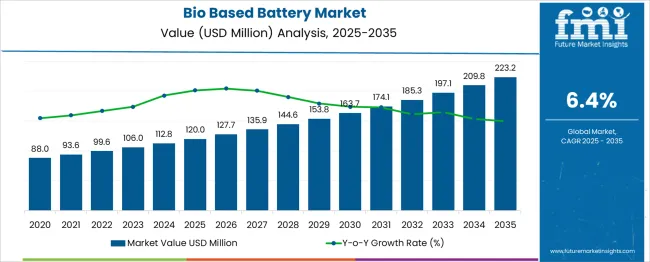
| Metric | Value |
|---|---|
| Bio Based Battery Market Estimated Value in (2025 E) | USD 120.0 million |
| Bio Based Battery Market Forecast Value in (2035 F) | USD 223.2 million |
| Forecast CAGR (2025 to 2035) | 6.4% |
The bio based battery market contributes modest but distinct shares across adjacent energy and materials ecosystems. Within the eco‑friendly energy storage materials market, bio‑based batteries capture 6–7%, reflecting the early-stage diffusion of biodegradable chemistries alongside conventional polymer and metallic systems. In the low‑power and disposable battery applications segment, their share rises to 12–14%, owing to suitability in single‑use medical devices, environmental sensors, and IoT units where rechargeability is less critical. Within the consumer electronics alternatives market, they account for 3–4%, due to current limitations in energy density compared to lithium-ion options. In the smart packaging systems sector, bio‑based battery integration represents 10–12%, as these units power embedded sensors while aligning with circular-design principles. For the research and specialty bio‑component development market, their share is 15–17%, reflecting growing investment in enzymatic, microbial and sugar-derived prototypes at pilot scale. The market is expanding due to rising regulatory pressure on battery waste, innovation in organic electrode materials, and accelerating interest in biodegradable power sources for low-power, discardable applications. These dynamics position bio‑based batteries as a high‑value experimental and niche solution in evolving clean-energy and material ecosystems
The Bio Based Battery market is undergoing notable expansion as industries transition toward sustainable energy storage alternatives aligned with global decarbonization goals. Growing emphasis on eco-friendly technologies has accelerated interest in renewable and biodegradable energy storage systems. Bio based batteries, composed of organic materials, are gaining traction for their reduced environmental impact and compatibility with circular economy principles.
Market momentum is being supported by increased funding in green energy innovation, strategic partnerships between academic institutions and industry players, and the rising need for alternative storage systems in off-grid and portable applications. In addition, regulatory encouragement for clean technologies and growing demand from sectors including consumer electronics, healthcare, and automotive have strengthened the commercial outlook.
Advancements in enzymatic and microbial fuel cell technologies are also improving the efficiency and scalability of these solutions, making them increasingly viable for high-performance uses. As the need for low-toxicity and biodegradable components grows, the Bio Based Battery market is expected to continue on a strong upward trajectory..
The bio based battery market is segmented by product, application, and sales channel and geographic regions. By product of the bio based battery market is divided into Enzymatic, Sugar, Microbial, and Others. In terms of application of the bio based battery market is classified into Healthcare, Consumer electronics, Electric vehicles, Stationary energy storage, IoT devices & sensors, and Others. Based on sales channel of the bio based battery market is segmented into Online, Dealer, and Retail. Regionally, the bio based battery industry is classified into North America, Latin America, Western Europe, Eastern Europe, Balkan & Baltic Countries, Russia & Belarus, Central Asia, East Asia, South Asia & Pacific, and the Middle East & Africa.
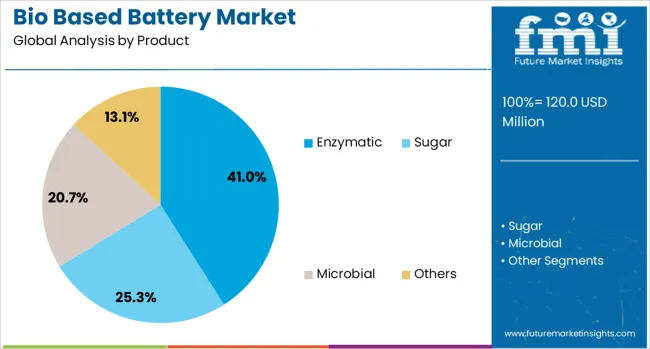
The enzymatic product segment is projected to capture 41% of the Bio Based Battery market revenue share in 2025, emerging as the leading product category. The dominance of this segment has been attributed to the ability of enzymatic systems to generate electrical energy from organic materials using bio-catalysts, providing a highly sustainable and low-emission solution. Adoption has been favored by their biodegradable nature and reduced reliance on heavy metals or rare-earth elements, which aligns with circular economy and environmental safety standards.
Enzymatic batteries have demonstrated promising performance for low-power, disposable, and implantable applications where compact form factors and biocompatibility are essential. Ongoing innovation in enzyme stability and electrode materials is further enhancing efficiency and extending the lifespan of these batteries.
The segment has gained additional traction in academic and research environments, as well as in medical diagnostics and wearable devices, where short-term energy needs and environmental considerations are critical. This growing appeal across high-value niches is expected to support the continued leadership of enzymatic batteries in the product landscape..
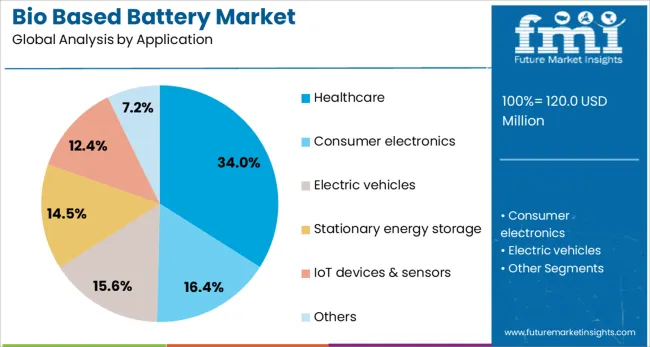
The healthcare application segment is expected to account for 34% of the Bio Based Battery market revenue share in 2025, positioning it as the leading application area. Growth in this segment has been driven by the increasing demand for sustainable power sources in medical devices, diagnostics, and wearable technologies. Bio based batteries have been adopted for their biocompatibility, safety, and ability to operate under physiological conditions, making them ideal for use in implantables, biosensors, and drug delivery systems.
The shift toward minimally invasive procedures and continuous health monitoring has intensified the need for compact and low-toxicity power sources, which enzymatic and microbial batteries are well suited to provide. Advances in bioelectronics and flexible medical devices have further expanded the scope for integration of these eco-conscious batteries.
Regulatory interest in reducing electronic waste in the healthcare sector has also contributed to adoption. As healthcare providers and manufacturers seek safer, biodegradable energy solutions, the segment is expected to maintain its leadership role in the application domain..
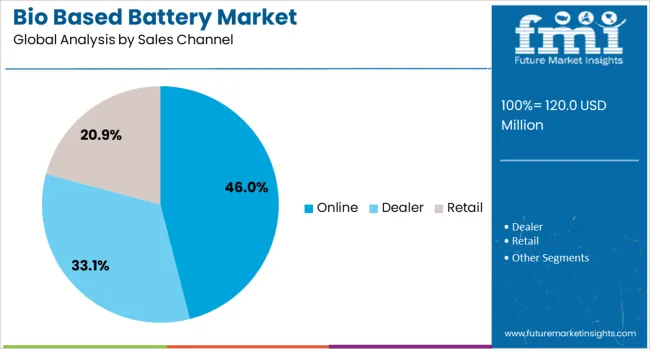
The online sales channel segment is projected to hold 46% of the Bio Based Battery market revenue share in 2025, establishing itself as the most dominant distribution channel. This leadership has been reinforced by the increasing digitization of procurement in both B2B and B2C markets, particularly for emerging technologies such as bio based batteries. Online platforms offer broader access to specialized and research-grade products that are often unavailable through traditional retail or distributor networks.
Convenience, transparency in pricing, and the ability to directly compare technical specifications have encouraged researchers, institutions, and small-scale manufacturers to procure via online channels. Additionally, e-commerce platforms have facilitated global reach for niche manufacturers, helping them engage a wider customer base without the need for extensive physical infrastructure.
The rise of direct-to-consumer marketing strategies and digital sales tools has further strengthened the online segment's reach. As purchasing behaviors continue to shift toward digital ecosystems, the online channel is expected to retain its prominence in the distribution landscape of bio based batteries..
Bio based batteries harness organic materials such as cellulose, algae derivatives, or bio‑polymers to provide energy storage with reduced reliance on traditional chemical substrates. These batteries find application in wearable electronics, medical implants, and low‑power smart sensors. Growth has been driven by rising interest in biodegradable or eco-focused energy systems and pressure to minimize hazardous waste. Suppliers that focus on biocompatible substrates, safe chemical systems, and consistent charge retention have gained traction. Products offering predictable cycling performance, low-risk disposal, and material traceability continue to influence adoption by researchers, medical device makers, and environmentally conscious technology users.
Uptake of bio based batteries has been supported by awareness around electronic waste and end-of-life disposal hazards. These batteries are preferred for single-use medical devices, disposable sensors, and biodegradable electronics where safe degradation is essential. Low toxicity of materials such as paper, starch, or natural polymers has made them attractive for medical and wearable use. Research institutions and early adopters continue to validate performance in low‑power environments. Increased demand for ultra-thin, flexible battery formats for smart labels or patch-style health trackers has accelerated adoption. Innovations in charge density and shelf life have reinforced credibility among developers seeking alternative energy sources that pose minimal disposal risks.
Adoption has been constrained by limited energy density and relatively low power output compared to lithium-based systems. Challenges in achieving stable charge-discharge cycling and consistent performance across environmental conditions have persisted. Material sourcing variability, for example, in biomass feeds, has led to inconsistencies in conductivity or electrode performance. Manufacturing processes remain complex, requiring specialized fab environments or post‑processing steps for polymer activation. Investors and supply chain partners have raised concerns about cost competitiveness when scaling production. Sustainability claims must be backed by standardized degradation tests, hydration stability checks, and defined disposal protocols before wider user confidence emerges.
Opportunities are emerging in medical, smart packaging, and environmental monitoring where small-scale batteries with safe disposal are preferred. Development of recyclable bio‑batteries for food tracking sensors or drug delivery systems offers meaningful differentiation. Collaborative initiatives between material scientists and device manufacturers are enabling tailored formulations tuned to specific form factors or operating lifecycles. University‑industry research partnerships are supporting pilot-scale production and demonstration kits. Emerging demand exists for bio‑batteries integrated into wearable patches or soft robots where biocompatibility is critical. Licensing bio‑battery platforms to specialized OEMs provides recurring revenue opportunities in niche but high-impact applications.
Emerging trends include integration of bio‑based batteries with energy harvesting mechanisms such as solar micro‑cells or piezoelectric fibers to extend operational life. Design emphasis is shifting toward fully biodegradable substrates including cellulose nanofiber electrodes and organic binders. Development of printed battery formats using inkjet or roll‑to‑roll printing is enabling low-cost flexible devices. Research into hybrid systems combining bio‑battery cores with supercapacitors or micro‑fuel cells is underway to improve energy density. Regulatory interest in biodegradable electronics testing protocols continues to rise. Increased visibility of field-deployed prototypes such as bio‑battery driven environmental sensors or single-use medical patches, is shaping acceptance among early commercial users.
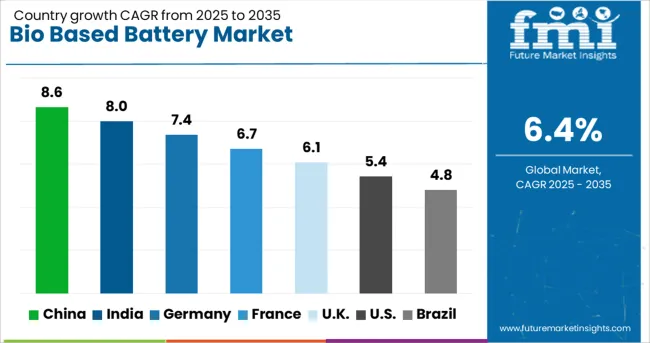
| Country | CAGR |
|---|---|
| China | 8.6% |
| India | 8.0% |
| Germany | 7.4% |
| France | 6.7% |
| UK | 6.1% |
| USA | 5.4% |
| Brazil | 4.8% |
The bio based battery market is projected to grow at a CAGR of 6.4% from 2025 to 2035, supported by rising demand for eco-friendly energy storage solutions and the shift toward alternative materials in battery production. BRICS nations lead growth, with China at 8.6% driven by large-scale manufacturing and clean energy investments, and India at 8.0% supported by electric mobility and storage applications. Among OECD economies, France grows at 6.7%, the United Kingdom at 6.1%, and the United States at 5.4%, focusing on technological innovation and renewable storage integration. The analysis includes over 40 countries, with the top five detailed below.
China is projected to grow at a CAGR of 8.6% through 2035, driven by significant investments in clean energy and energy storage systems. Domestic manufacturers are introducing bio based batteries derived from organic materials for use in consumer electronics and grid storage applications. The push for reducing reliance on synthetic components has led to advanced research in cellulose and lignin-based battery technologies. Growing adoption in electric vehicles and distributed energy storage enhances demand further. Online distribution networks and local partnerships are strengthening supply channels for new-generation batteries. With rising emphasis on environmental compliance and innovation, China remains a key hub for bio based battery development.
India is expected to post a CAGR of 8.0% through 2035, supported by increasing deployment of renewable energy projects and growing interest in electric mobility. Bio based batteries are gaining attention as alternatives to conventional lithium-ion solutions due to their organic composition and recyclability. Domestic manufacturers are working on low-cost, biodegradable energy storage solutions for residential and rural applications. Partnerships between startups and energy firms are driving pilot projects for integrating bio based batteries in solar-powered microgrids. Expansion in e-commerce platforms for green energy products further supports accessibility. India’s evolving energy landscape and focus on environmental safety will continue to shape future adoption.
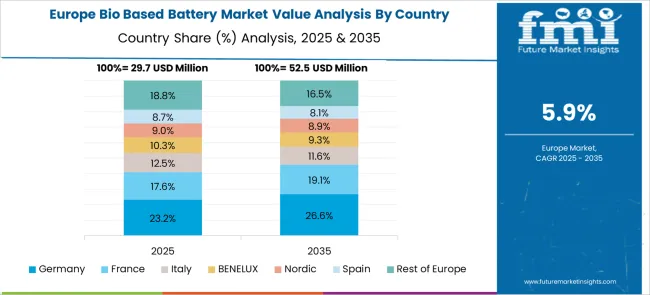
France is projected to achieve a CAGR of 6.7% through 2035, driven by research-led advancements and increased demand for eco-friendly storage solutions. Manufacturers are focusing on polymer-based and cellulose-derived components to replace synthetic elements in energy storage systems. Strong adoption is expected in residential energy storage and portable electronic devices. Strategic initiatives promoting clean energy integration with smart grids are fueling demand for efficient storage technologies. France’s emphasis on environmental regulations and circular economy practices is encouraging suppliers to invest in sustainable alternatives. Product customization for small-scale renewable installations adds further growth potential for the market.
The United Kingdom is forecasted to grow at a CAGR of 6.1% through 2035, supported by a steady shift toward renewable energy storage and electrified transport solutions. Manufacturers are developing bio derived components for hybrid battery systems aimed at residential energy storage and off-grid solutions. Growing interest in green building energy systems is increasing demand for compact and efficient storage units. Distribution is dominated by online retailers and specialist energy solution providers offering customized products. Strong research initiatives, backed by academic-industry collaborations, continue to push for higher energy density and faster charging in bio based batteries.
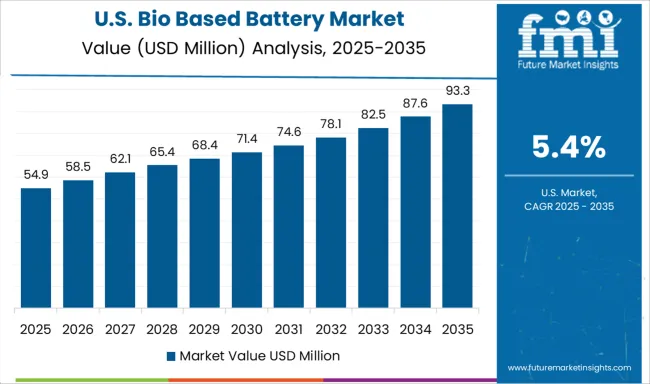
The United States is projected to grow at a CAGR of 5.4% through 2035, driven by technological advancements and adoption in sustainable energy storage. Leading companies are experimenting with lignin-derived and bio-polymer materials to reduce dependence on metals in battery production. Adoption is prominent in consumer electronics and distributed energy storage for renewable projects. Startups are focusing on commercializing high-performance organic batteries with longer life cycles and safer disposal methods. Supportive government incentives for low-carbon technologies further drive development efforts. However, cost competitiveness and scalability challenges remain key hurdles to mainstream adoption in the US market.
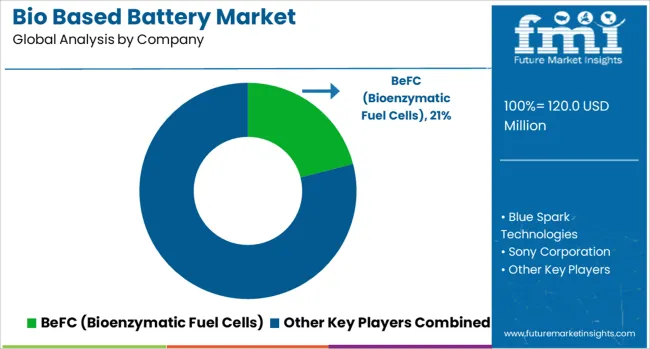
The bio based battery market is emerging as a high-potential segment within sustainable energy storage, driven by companies like BeFC (Bioenzymatic Fuel Cells), Blue Spark Technologies, Sony Corporation, Bioo, NEC Corporation, and other innovative players. BeFC leads with bioenzymatic fuel cells that utilize enzymes and organic substrates to generate power, targeting medical devices, wearables, and low-power IoT applications. Blue Spark Technologies focuses on thin, flexible bio-based power solutions for smart packaging, health monitoring, and RFID-enabled systems, leveraging cost efficiency and compact design advantages. Sony Corporation and NEC Corporation bring strong R&D capabilities and advanced material science expertise to develop organic electrode technologies for eco-friendly energy storage systems. Bioo differentiates through bioenergy solutions that harvest energy from organic matter in soil, offering a unique approach to powering agricultural sensors and remote IoT devices. Competitive strategies are centered on improving energy density, enhancing biocompatibility, and reducing material costs to enable scalable production. Barriers to entry include the complexity of bioelectrochemical processes, durability concerns, and compliance with safety and environmental standards. Players are actively investing in collaborative research programs with academic institutions and industrial partners to accelerate commercialization. The market is witnessing increasing interest in applications such as medical implants, environmental monitoring, and smart wearables, where low-power, disposable, and biodegradable power sources are critical.
| Item | Value |
|---|---|
| Quantitative Units | USD 120.0 Million |
| Product | Enzymatic, Sugar, Microbial, and Others |
| Application | Healthcare, Consumer electronics, Electric vehicles, Stationary energy storage, IoT devices & sensors, and Others |
| Sales Channel | Online, Dealer, and Retail |
| Regions Covered | North America, Europe, Asia-Pacific, Latin America, Middle East & Africa |
| Country Covered | United States, Canada, Germany, France, United Kingdom, China, Japan, India, Brazil, South Africa |
| Key Companies Profiled | BeFC (Bioenzymatic Fuel Cells), Blue Spark Technologies, Sony Corporation, Bioo, NEC Corporation, and Others |
| Additional Attributes | Dollar sales by technology type (bioenzymatic fuel cells, microbial fuel cells, bio-organic batteries) and application (medical devices, IoT sensors, smart packaging, agricultural monitoring), with demand driven by the push for eco-friendly and flexible energy solutions. Regional dynamics indicate strong innovation hubs in Europe and North America, while Asia-Pacific emerges as a key market for large-scale deployment in consumer electronics and IoT devices. Innovation trends include enzyme-immobilized electrodes for higher power output, printable bio-based battery formats for packaging applications, and biodegradable components to reduce electronic waste in short-lifecycle devices. |
The global bio based battery market is estimated to be valued at USD 120.0 million in 2025.
The market size for the bio based battery market is projected to reach USD 223.2 million by 2035.
The bio based battery market is expected to grow at a 6.4% CAGR between 2025 and 2035.
The key product types in bio based battery market are enzymatic, sugar, microbial and others.
In terms of application, healthcare segment to command 34.0% share in the bio based battery market in 2025.






Full Research Suite comprises of:
Market outlook & trends analysis
Interviews & case studies
Strategic recommendations
Vendor profiles & capabilities analysis
5-year forecasts
8 regions and 60+ country-level data splits
Market segment data splits
12 months of continuous data updates
DELIVERED AS:
PDF EXCEL ONLINE
Biological Indicator Vial Market Size and Share Forecast Outlook 2025 to 2035
Bioplastic and Biopolymer Market Forecast Outlook 2025 to 2035
Biodegradable Paper and Plastic Packaging Market Size and Share Forecast Outlook 2025 to 2035
Biocatalysis and Biocatalyst Market Size and Share Forecast Outlook 2025 to 2035
Biodegradable Polyester Fiber Market Forecast and Outlook 2025 to 2035
Biopsy Device Market Forecast and Outlook 2025 to 2035
Bio-wax Market Forecast and Outlook 2025 to 2035
Bioliquid Heat and Power Generation Market Size and Share Forecast Outlook 2025 to 2035
Biocontrol Solutions Market Size and Share Forecast Outlook 2025 to 2035
Biocement Market Size and Share Forecast Outlook 2025 to 2035
Biomedical Refrigerator and Freezer Market Size and Share Forecast Outlook 2025 to 2035
Biodegradable Packaging Market Size and Share Forecast Outlook 2025 to 2035
Bionic Glove's Market Size and Share Forecast Outlook 2025 to 2035
Biodegradable Insulated Panel Market Size and Share Forecast Outlook 2025 to 2035
Biopotential Sensor Market Size and Share Forecast Outlook 2025 to 2035
Biomaterial Tester Market Size and Share Forecast Outlook 2025 to 2035
Biocompatible Materials Market Size and Share Forecast Outlook 2025 to 2035
Biomass Pellets Market Size and Share Forecast Outlook 2025 to 2035
Biosimilar Testing Services Market Size and Share Forecast Outlook 2025 to 2035
Biostimulants Market Size and Share Forecast Outlook 2025 to 2035

Thank you!
You will receive an email from our Business Development Manager. Please be sure to check your SPAM/JUNK folder too.
Chat With
MaRIA